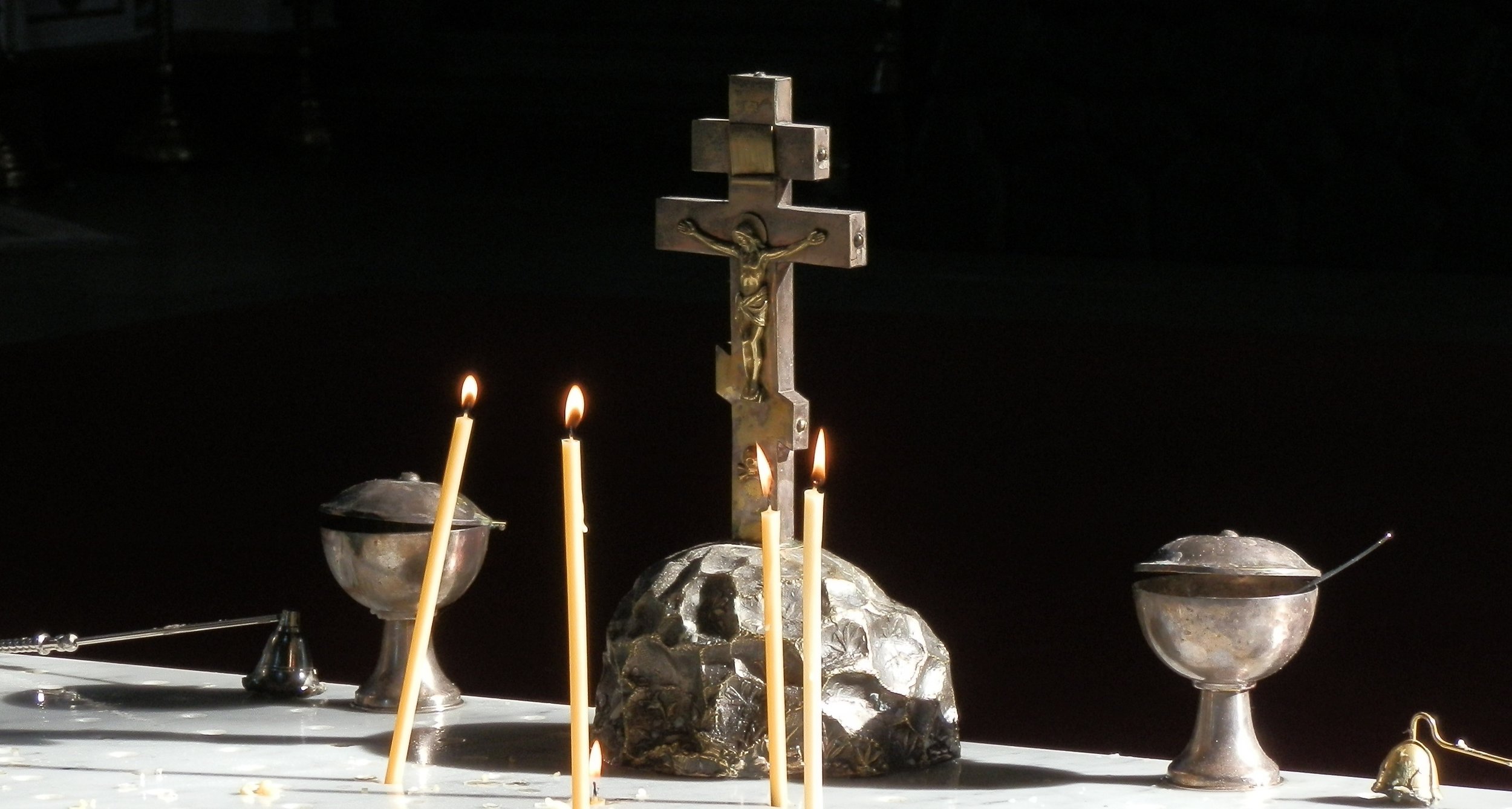Christian Restorative Justice
In the Protestant Traditions
Photo credit: Vishnu Gs, Wikimedia Commons.
Introduction
These resources explore Christians reflections from the Protestant traditions, on God’s vision for relationships between human beings, and also between human beings and the created world.
Other Resources on Christian Restorative Justice in the Protestant Traditions
The Jubilee Centre (website)
Evangelical Labor Institute (website) has very good articles, including Dawson Vosburg, Is Capitalism Christian? (Evangelical Labor Institute, Jan 25, 2021), which links to Dawson Vosburg, What Is Economic Egalitarianism? (Evangelical Labor Institute, Sep 15, 2020) and Patrick Bourckel, The New Testament and Economic Equality (Evangelical Labor Institute, Oct 28, 2020)
Theology of Work (website) an excellent resource; for example Theology of Work Project, Gleaning (Leviticus 19:9 - 10) and Theology of Work Project, The Sabbath Year and the Year of Jubilee (Leviticus 25) and Theology of Work Project, Wealth Gained Through Unjust Means is Harmful and Theology of Work Project, What the Bible Says About Sustainability which is an intriguing reflection on Numbers 35
Jesus Radicals (website)
The New Evangelical Partnership for the Common Good (website)
Political Theology Today: A Forum for Clergy, Students, and Scholars (website)
Political Theology (journal, Maney Publishing website)
Creation Justice Ministries (website)
Discovery Institute on Human Exceptionalism (website)
Ethics Driven Innovation (website) a consulting company
Edward Alsworth Ross, Sin and Society: An Analysis of Latter-Day Iniquity. Occupy and Liberate blog, originally 1907)
Martin Luther King, Jr. on Love and Power (youtube video)
Jacques Ellul, Money and Power (pdf book, 1954, 1984); Ellul is a dialectical thinker and writer who changes the dialectic from ideas (Hegel) and material (Marx) to that of humanity and God. I appreciate his analyses and insight, but Ellul’s theological anthropology is too dualistic, as God’s work in humanity in general (including non-Christians) is through the conscience, or our common human nature. Ellul’s individualistic anarchism is an extreme which needs to be subordinated to a relational ethic found in God’s creation order and reaffirmed by Jesus, against which nations and states often collide and interfere.
Jacques Ellul, The Theological Foundation of Law. Seabury Press | Amazon page, 1961.
Jacques Ellul, Propaganda: The Formation of Men's Attitudes (pdf book, 1962, 1965)
Jacques Ellul, The Technological Society (pdf book, 1964)
Jacques Ellul, The Political Illusion (pdf book, 1965, 1967) and Yuval Noah Harari, Why Technology Favors Tyranny. The Atlantic, Oct 2018.
Jacques Ellul, The Politics of God and the Politics of Man (pdf book, 1966, 1972)
Jacques Ellul, A Critique of the New Commonplaces (pdf book, 1968)
Jacques Ellul, Violence: Reflections from a Christian Perspective (pdf book, 1969)
Jacques Ellul, The Meaning of the City. Eerdmans | Amazon page, 1970.
Jacques Ellul, Autopsy of Revolution (pdf book, 1971)
Jacques Ellul, The New Demons (pdf book, 1973, 1975)
Jacques Ellul, The Betrayal of the West (pdf book, 1975, 1978)
Jacques Ellul, The Technological System (pdf book, 1977 1980)
Jacques Ellul, Jesus and Marx (pdf book, 1979, 1988)
Jacques Ellul, The Subversion of Christianity. Eerdmans | Amazon page, 1986. Chapter 5 is Jacques Ellul, Islam and Judeo-Christianity: A Critique of Their Commonality (pdf book)
Jacques Ellul, Anarchy and Christianity (pdf book, 1988, 1991)
Jacques Ellul, The Technological Bluff (pdf book, 1988, 1990)
Jacques Ellul on the Impossibility of Integrating Muslims in Western Societies (Jacob Thomas, Faith Freedom, comments from 1994)
Jacques Ellul website in French
Richard B. Hays, The Moral Vision of the New Testament. HarperOne | Amazon page, 1986.
Timothy Gorringe, Capital and the Kingdom: Theological Ethics and Economic Order. Orbis Books | Amazon page, Mar 1994.
Oliver M.T. O'Donovan, Resurrection and Moral Order. Eerdmans | Amazon page, 1994.
John Howard Yoder, The Politics of Jesus. Eerdmans | Amazon page, 1994.
Timothy Gorringe, God's Just Vengeance: Crime, Violence, and the Rhetoric of Salvation. Cambridge University Press | Amazon page, May 1996. A must read on both theology and ethics. Gorringe observes that wherever Calvinism goes, punitive sentencing follows.
Duncan B. Forrester, Christian Justice and Public Policy. Cambridge University Press | Amazon page, 1997.
Oliver O’Donovan and Joan Lockwood O’Donovan, From Irenaeus to Grotius: A Sourcebook in Christian Political Thought. Eerdmans | Amazon page, 1999. See also this bibliographic summary by Patristic Evangelism, Readings in Patristic Ethics. Patristic Evangelism blog, date unknown.
Oliver O’Donovan, The Desire of Nations: Rediscovering the Roots of Political Theology. Cambridge University Press | Amazon page, 1999. O’Donovan deals with the biblical presentation of the church, states, and Israel - not simply 'church and state' - and does an excellent job in biblical exposition and church history. Foundational exegesis.
Robert M. Frakes, Contra Potentium Iniuras: The Defensor Civitatis and Late Roman Justice. Google book, 2001.
Timothy Gorringe, Fair Shares. Thames & Hudson | Amazon page, Jun 1999.
Christopher D. Marshall, Beyond Retribution: A New Testament Vision for Justice, Crime, and Punishment. Eerdmans | Amazon page, 2001. See also Christopher D. Marshall website.
Timothy Gorringe, The Education of Desire: Toward a Theology of the Senses. Trinity Press International | Amazon page, 2001.
Craig Bartholomew (editor), A Royal Priesthood? The Use of the Bible Ethically and Politically: A Dialogue with Oliver M.T. O'Donovan. Zondervan Academic | Amazon page, 2002.
Christopher D. Marshall, Atonement, Violence, and the Will of God: A Sympathetic Response to J. Denny Weaver's The Non-Violent Atonement. Goshen, Jan 2003.
Glen Stassen and David Gushee, Kingdom Ethics. InterVarsity Press | Amazon page, 2003.
Oliver O’Donovan, Bonds of Imperfection: Christian Politics, Past and Present. Eerdmans | Amazon page, 2003. O’Donovan covers leading Christian thinkers, actors, and decisions in pre-modern and modern Western history.
Nicholas Wolterstorff, Does Forgiveness Violate Justice? (pdf book, 2003)
John Milbank, Being Reconciled: Ontology and Forgiveness. Routledge | Amazon page, 2003.
Timothy Gorringe, Furthering Humanity: A Theology of Culture. Routledge | Amazon page, May 2004.
Timothy Gorringe, Crime: Changing Society and the Churches. SPCK | Amazon page, 2004.
Brian Morgan, The Eighth Commandment: The Economy: It's Not Up for Grabs. PBC Cupertino, Nov 20, 2005. Sermon.
John Milbank, Theology and Social Theory: Beyond Secular Reason. Wiley-Blackwell | Amazon page, 2006.
Joe Palca, The Amish Culture of Forgiveness. NPR, Oct 9, 2006.
Oliver M.T. O'Donovan, The Ways of Judgement. Eerdmans | Amazon page, 2008.
N.T. Wright, God in Public? Reflections on Faith and Society. Fulcrum, Feb 14, 2008.
Christian Today, Dr. Michael Schluter on Relational Thinking and Transforming Society. Christian Today, Sep 26, 2008.
Nicholas Wolterstorff, Justice: Rights and Wrongs (pdf book, 2008)
Frederick M. Shepherd, Christianity and Human Rights: Christians and the Struggle for Global Justice (pdf book, 2009) Part 1 contains chapters about genocide and Dickensian poverty. Part 2 contains chapters about religious freedom and democracy. Part 3 contains chapters about foundations for human dignity, economic justice, and human flourishing. Part 4 contains case study chapters on the poor in the Andes, ethnic minorities in Vietnam, and post-Apartheid South Africa.
Marcia Pally, The New Evangelicals: Expanding the Vision of the Common Good. Eerdmans | Amazon page, 2011.
Herbert McCabe, OP, The Class Struggle and Christian Love. The Bias Magazine: The Voice of the Christian Left, 2012.
Robert Woodberry, The Missionary Roots of Liberal Democracy. American Political Science Review, May 2012. See video presentation: Robert Woodberry, The World the Missionaries Made. Southeastern Baptist Theological Seminary, May 21, 2019. See also interview, Geopolitics and Empire, Robert Woodberry: Empire and the Missionary Roots of Liberal Democracy. Geopolitics and Empire, Jun 4, 2020.
Andy Crouch, What's So Great About the Common Good? Christianity Today, Oct 12, 2012.
John Milbank, Are the New Evangelicals a New Phenomenon or a Reversion to Type? blog, Jan 18, 2013.
Stan Gushee, The Sacredness of Human Life. Eerdmans | Amazon page, Jan 2013.
Brian Steensland, Philip Goff, The New Evangelical Social Engagement. Oxford University Press | Amazon page, 2013.
Andy Crouch, Playing God: Redeeming the Gift of Power. Andy Crouch website, 2013.
Andy Crouch, It's Time to Talk About Power (blog)
Trevin Wax, When John Stott Confronted Billy Graham. The Gospel Coalition, May 8, 2013.
Paul Buhle, Radical Jesus: A Graphic History of Faith. Herald Press | Amazon page, 2013.
John Milbank, The Myth of the Secular. video, Nov 14, 2013.
Larry Siedentop, Inventing the Individual: The Origins of Western Liberalism (pdf book, 2014)
Andrea Palpant Dilley, The Surprising Discovery About Those Colonialist, Proselytizing Missionaries. Christianity Today, Jan 8, 2014)
Timothy C. Morgan, Why We're Losing the War on Poverty. Christianity Today, Jan 8, 2014. An interview with Gary Haugen about the rule of law.
Gary Haugen, The Poor Deserve Equal Protection Under the Law. Washington Post, Jan 26, 2014.
Scott Bessenecker, Would Jesus Occupy Wall Street? Sojourners, Oct 24, 2014.
Larry Siedentop, Inventing the Individual: The Origins of Western Liberalism. pdf book, Mar 31, 2015.
Ted Grimsrud, Healing Justice. Peace Theology, Jun 28, 2015.
David Cayley, Craig Calhoun, Rajeev Barghava, The Myth of the Secular. CBC Radio, Jul 2, 2015. Part 6 features John Milbank and Radical Orthodoxy.
Matthew Tuininga, The Gospel, Liberalism, and Social Hierarchy. The Calvinist International, Jul 21, 2015. A good attempt from within the Reformed tradition, which tends not to take creation order and 1 Corinthians 6 - 7 into adequate account, as seen in the exhaustion of David Williams, Why Social Justice Is Not Christian. The Christian Century, Apr 10, 2016. Exhaustion is also evident in the division between spirituality and human relations in Mark Goodnight, 'Social Justice' Is Not in the Gospel. Cyber Penance, Jan 16, 2017.
N.T. Wright, The Kingdom of God as Cruciform Theocracy. St. Paul’s Cathedral, Oct 21, 2015. See summary by Florence Taylor, Bishop Tom Wright: There Should Be No Division Between Church and Politics. Christian Today, Oct 21, 2015. “Since the enlightenment, the West has seen the world in dualistic terms, splitting heaven and earth, forcing the Gospels into the wrong framework, Wright said. He suggested that the Church's collusion with secularism has enabled the message of the cross to shift "from the ultimate victory over the principalities and powers, to simply the mechanism of dealing with individual sins." Jesus came "to inaugurate God's sovereign saving rule of Earth as it is in heaven by means of the cross," which Wright said caused "the modern world and much of the modern church to rebel and recoil."”
Peter Enns, What Is It With Evangelicals and Politics? blog, Nov 5, 2015. Enns notes that Christianity and political rhetoric are rival eschatologies.
Ronald Osborn, The Scandalous Origins of Human Rights. Veritas Forum, Jan 15, 2016.
Andrew Fulford, On Merit and (Social) Justice. The Calvinist International, Apr 5, 2016. Fulford nites a personal obligation to help the poor with government action enforcing some redistribution of wealth; note, however, that the author must frame this government action as "punishment": "the concept of punishment is justified as a communicative act that adequately declares the evil of the offense by returning a kind of evil on the offender."
Roger E. Olson, Reinhold Niebuhr and Stanley Hauerwas: Can Their Christian Political Ethics be “Bridged?” Patheos, Feb 27, 2017.
Victor Tan Chen, The Spiritual Crisis of the Modern Economy. The Atlantic, Dec 21, 2016. A critique of pure meritocracy.
Rod Dreher, Capitalism, Community, Christianity. The American Conservative, Jan 10, 2017. Dreher says capitalism creates rot from within, and nationalism is not the answer.
Michael Grenholm, Why Most Pentecostals Around the World Are Progressive. Pentecostals and Charismatics for Peace and Justice, Jan 28, 2017. “As Pentecostals become more educated, they are beginning to understand the structural origins of poverty rather than simply responding to immediate needs related to food and shelter.”
Richard Beck, The Paradox of Progressive Political Theology. Experimental Theology blog, May 1, 2017.
Richard Beck, How Did Political Progressives Think They Were Anabaptists? Mennonite World Review, May 15, 2017. Helpful contrast with political liberalism, but it's important to distinguish between political liberalism as a tool vs. political liberalism as an eschatology.
Steven Weitzman, The Theology Beneath the Trump-Comey Conflict. Christianity Today, May 19, 2017. The theology of Reinhold Niebuhr about power, and Comey's study of Niebuhr.
Rod Dreher, America’s Culture War On Russia. The American Conservative, May 24, 2017.
David Opderbeck, Martin Luther on Economics. Through a Glass Darkly blog, Jun 14, 2017.
James K. A. Smith, Awaiting the King: Reforming Public Theology. Baker Academic | Amazon page, Nov 2017.
Jonathan Tran, Trump and the Specter of Christian Withdrawal. Marginalia, Jun 6, 2018.
Michael Gerson, A Case Study in the Proper Role of Christians in Politics. Washington Post, Jun 21, 2018.
N.T. Wright, Resurrection and the Renewal of Creation. Baylor’s Truett Seminary, Dec 14, 2018. An excellent lecture about creation and justice, traced through creation to Israel to Jesus and the church based on the relation of God and the human body.
John Milbank, Economics After Luther. Church Life Journal, Jun 13, 2019.
Fred Clark, Jubilee Always Makes Some People Angry. Slacktivist | Patheos, Jul 24, 2019.
David Bentley Hart, Three Cheers for Socialism: Christian Love and Political Practice. Commonweal Magazine, Feb 24, 2020. An Eastern Orthodox American philosopher, Hart draws widely, writing, ““Socialism” is far from a univocal term, and much further from a uniform philosophy. I, for instance, have a deep affection for the tradition of British Christian socialism, which was shaped by such figures as F. D. Maurice (1805–1872), John Ruskin (1819–1900), Charles Kingsley (1819–1875), Thomas Hughes (1822–1896), F. J. Furnivall (1825–1910), William Morris (1834–1896), and R. H. Tawney (1880–1962), though I have also been influenced by such non-British social thinkers as Sergei Bulgakov (1871–1944), Dorothy Day (1897–1980), and E. F. Schumacher (1911–1977). None of these espoused any kind of statist, technocratic, secular, authoritarian version of socialist economics, and none of them was what we today think of as “liberal.” And yet their “socialist” leanings were unmistakable.”
Lyman Stone, Christianity Has Been Handling Epidemics for 2,000 Years. Foreign Policy, Mar 13, 2020. Stone includes stories from the early church and the Lutheran tradition.
Father Caleb Roberts, Against Nature? The Shutdown and the Politics of Reaction. The Bias Magazine: The Voice of the Christian Left, March 2020. Critiques R.R. Reno, who agreed that the elderly should be risked for the sake of the economy during the COVID-19 stay at home order.
Bronson Barringer, The Business of War: Theological and Ethical Reflections on the Military-Industrial Complex. Wipf and Stock | Amazon page, Mar 2020. An outstanding collection of essays about U.S. militarism and its impacts on domestic and foreign affairs. Especially good are the chapters highlighting U.S. hegemony over Latin America, Korea, and elsewhere on the grounds of fighting “communism.”
Hugh McDonnell, The Left Side of the Church: Liberation Theology's Legacy. Jacobin Magazine, May 18, 2020. An examination of Latin America as a spotlight of liberation theology’s practical legacy.
Sam Haist, Why Our Sunday School Disciples Christians in Politics. Christianity Today, Sep 2020. “If churches don’t engage our members, pundits and memes will.”
Heath W. Carter, Inequality is a Life Issue: Reflections from Christian Social Teaching. Georgetown University Berkley Center for Religion, Peace & World Affairs, Sep 1, 2020.
Catharine Richert, From COVID to QAnon, Church Makes Disinformation Training a Question of Faith. Minnesota Public Radio News, Oct 27, 2020.
Tony Keddie, U.S. Republicans and the Fallacy of Biblical Capitalism. The Bible and Interpretation blog, Aug 2020.
Fran Quigley, To Rev. Angela Cowser, “the Biblical Basis for Socialism Is Undeniable”. Jacobin Magazine, Dec 25, 2020. More of a biographical sketch rather than an exploration of her interaction with Scripture. Mentioned are Acts and the Jubilee principle.
Kristin du Mez, Josh Hawley, Betsy DeVos, and Abraham Kuyper: A Reckoning. Anxious Bench | Patheos, Jan 14, 2021 “At Dordt College, our neo-Kuyperian professors educated us on the value of a “Reformed worldview” in which there is no divide between sacred and secular or nature and grace, and in which every domain of life is to be brought under the “lordship” of Jesus. A famous line from Kuyper’s speech to open the Free University in 1880, which he founded as an expression of this philosophy, was often quoted at Dordt: “There’s not a square inch in the whole domain of human existence over which Christ, who is Lord over all, does not exclaim, ‘Mine’!” Our professors contended that Kuyper provided a road map for Christians living in a pluralistic context. Christians should build distinctly Christian institutions and systems to promote the “kingdom of God,” while also working to support the common good.” An exploration of Betsy DeVos and Josh Hawley — their attempts to use Kuyper’s political theology. However, see also David Koyzis, Misreading Kuyper? Stewart, Hawley, and the New York Times. Kuyperian, Jan 26, 2021. Offers important points but concedes that “the lordship of Christ” should be thought of in Kuyper’s territorial terms, “every square inch of creation,” which does not give enough space to non-Christians and a principled pluralism. It is too easily translated into monolithic terms which nation-states prefer.
Trevor Saxby, ‘Feed the Hungry, Clothe the Naked’: The Social Conscience of John Wesley. Mining for Gold, Jan 22, 2021.
Daniel J. Ott, Means and Ends When the Future is Open. Center for Open and Relational Theology, 2021. Argues from an open theism framework, and for political ethics, refers approvingly to Dr. MLK Jr. and his ethic of love.
Eugene Debs, Jesus, the Supreme Leader. Jacobin Magazine, Dec 25, 2021. Deb’s original remarkable 1914 essay. “Jesus was not divine because he was less human than his fellowmen but for the opposite reason that he was supremely human, and it is this of which his divinity consists, the fullness and perfection of him as an intellectual, moral, and spiritual being.”
Stephen Freeman, The True Dignity of Human Beings – Nyssa on Slavery. Ancient Faith Ministries, Jan 31, 2022. Contains the entirety of Nyssa’s Fourth Homily on Ecclesiastes, for which he is famous for making abolitionist comments.
Rodney Clapp, Capitalism Is Not Natural. Plough, Feb 10, 2022. “God’s economy is the opposite of today’s reigning neoliberalism.”
Richard Wolff, Economic Update: Christian Socialism. Democracy At Work, Mar 28, 2022. Wolff interviews Prof. Joerg Rieger on Christian Socialism, past and present.
Anne Levin, The Institute for Christian Socialism Wants to Bring Left Politics to American Christianity. Jacobin Magazine, Jul 4, 2022. “ICS cofounder Angela Cowser, associate dean of black church studies at Louisville Presbyterian Theological Seminary, hopes to organize new ICS members around economics, politics, and religion in their base societies. She wants to see these three areas organized around an understanding of a “jubilee economy,” in which debt is forgiven and poverty is eliminated . . . ICS cofounder Timothy Eberhart, associate professor of theology and ecology at Garrett-Evangelical Theological Seminary, laments the lack of religious people organizing on the Left, especially given how powerful faith can be in sustaining people through the hard work of social change . . . Joshua Davis, an Episcopalian theologian and ICS’s executive director, hopes the base societies will reclaim politically radical Christian traditions as a means of building networks of power. A nondenominational organization, it hopes to impact churches of all kinds and to draw people together in an expression of solidarity with emancipatory secular struggles.”
Institute for Christian Socialism, How Can Christian Socialists Build Deep Solidarity? Apr 15, 2021. With panelists Timothy Eberhart, Jeremy Posadas, Sarah Ngu and Obery Henricks, we explored how Christian socialists are once again reclaiming the best of various radical Christian socialist traditions, as well as how deep solidarities and intersectional analysis can deepen the theological, economic, and political resources for Christian socialisms today.
C.S. Lewis, Where Your Treasure Is. Plough, Jul 20, 2023. Includes readings from Nikolai Berdyaev, Basil of Caesarea, Maria Skobtsova, and Dorothy Day.
Benjamin M. Smith, Justice and Justification. Dissertation. Quest for One blog, 2023. Abstract: “Justification is said to be the article by which the church stands or falls, but Western ideas of justice differ significantly from those expressed in scripture and in the earliest fathers. This paper will trace the twin ideas of justice and justification from the concepts and language of the Greek Old Testament to quotations and usage of such language in the New Testament and the Greek Fathers. It will then contrast these with the ideas of the Latin Fathers, showing a distinct change in doctrine with the shift to Latin. Modern non-Western traditions, such as Orthodoxy, have views more closely aligned with the Greek Fathers. This reveals that language and cultural barriers created a doctrinal difference that persists to the present day. I conclude that Western conceptions of justice and justification are cultural artifacts that inhibit advancing the gospel in a post-modern world and divide the church.” Smith covers the Old Testament, the New Testament, and the Early Church.
Sources of Christian Restorative Justice:
This section explores theological reflection on God’s justice as restorative: in Scripture; the Early Church up to John of Damascus; the Orthodox tradition, both Eastern and Oriental; the Roman Catholic tradition; and the Protestant tradition. See our Restorative Justice Tutorial, or go back to the main page of Sources, or the main page of Politics for how to apply this vision.








